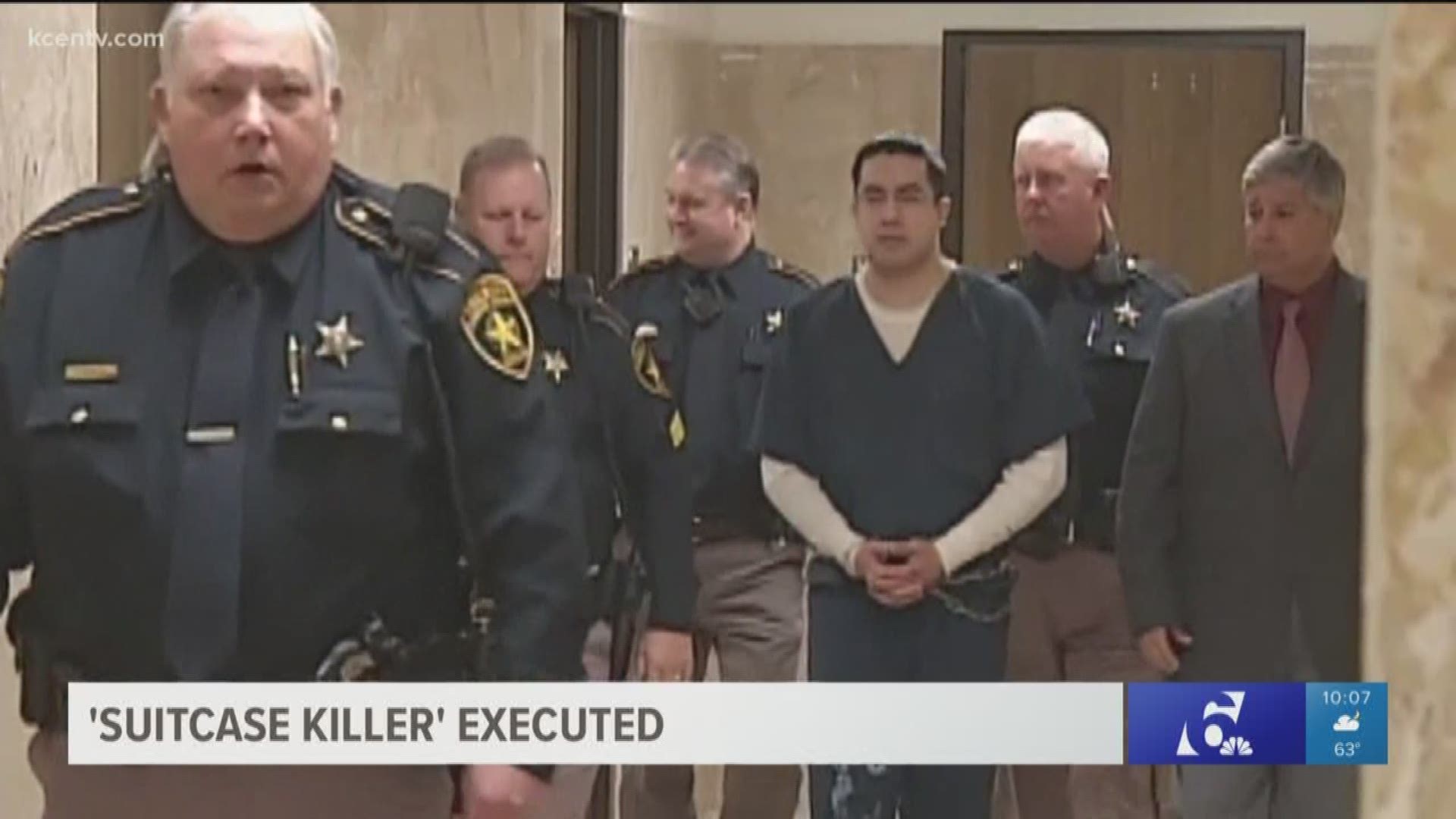The man dubbed Lubbock’s “suitcase killer” was executed Tuesday evening, one day after his 38th birthday.
Rosendo Rodriguez was sentenced to death in the 2005 murder and sexual assault of Summer Baldwin, a newly pregnant prostitute, according to court records. Baldwin’s body was found folded inside a suitcase at the city’s landfill. Rodriguez was also implicated in the 2004 murder of 16-year-old Joanna Rogers, whose body was also found in a suitcase in the landfill after Baldwin was discovered.
Just minutes before his execution was scheduled at 6 p.m., the U.S. Supreme Court denied his final appeal, and the process to put Rodriguez to death began on time. He was placed on a gurney, connected to an IV, and uttered his last words while his family and the parents of Baldwin and Rogers watched on through a glass pane.
In his final statement, Rodriguez called for an investigation into the Lubbock County district attorney and medical examiner, saying they were involved in thousands of wrongful convictions. He also called for a boycott of Texas businesses until the death penalty is stopped.
“Yesterday was my birthday. Today is the day I join my God and father,” he added, according to the Texas Department of Criminal Justice. “The state may have my body but not my soul.”
He died at 6:46 p.m., 22 minutes after a lethal dose of pentobarbital was injected into his veins. He was the fourth person executed in Texas this year and the seventh in the nation.
Lubbock County Criminal District Attorney Matt Powell told The Texas Tribune on Monday that he found no joy in the execution but that Rodriguez was a man who deserved the ultimate punishment.
“Who sticks a human being in a suitcase and throws them out with the trash?” Powell questioned. “This was a guy that, left unchecked, was going to hurt somebody else again and was going to continue to terrorize women.”
At the time of Baldwin’s death, Rodriguez was in Lubbock training for the U.S. Marines, according to court opinions. He was tied to the murder after investigators found the suitcase she was in had been purchased with Rodriguez’s debit card. Further investigation found Baldwin’s blood and a tag for the suitcase in his hotel room.
Rodriguez told police the two had consensual sex but that when he fought with her over her drug use afterward, she lunged at him with knives and he put her in a chokehold, accidentally killing her. But the medical examiner, Sridhar Natarajan, said Baldwin’s body showed injuries consistent with sexual assault, upping the charges and making the murder case eligible for the death penalty.
Prosecutors offered to accept a life sentence instead of the death penalty if Rodriguez also confessed to the murder of Rogers the year before and helped authorities find her body, according to court documents. He was already connected to her disappearance before Baldwin’s murder based on internet chats and phone records. Rodriguez confessed to Rogers’ murder and told investigators he had also put her body in a dumpster in a suitcase. She was eventually found in the same landfill as Baldwin.
But before the court appearance to finalize the plea deal, Rodriguez backed out, claiming he couldn’t understand anything he was being told by his attorney. Though they couldn’t use the Rogers confession, Lubbock County prosecutors decided to seek the death penalty in Baldwin’s case.
He was found guilty of capital murder and, during his punishment trial, though attorneys presented evidence of an abusive, alcoholic father and his family portrayed Rodriguez as a prior Texas Tech student who could have become president, ex-girlfriends and other women said he raped or assaulted them. The jury chose death.
But Rodriguez’s lawyers fought to the end. His last appeal argued that a recent lawsuit calls into question the credibility of the medical examiner’s testimony that defined the Baldwin case as sexual assault — which is what made the case a death penalty case. (Prosecutors at trial also argued Rodriguez’s case could be death-penalty eligible because Baldwin was pregnant, but the argument was pushed aside in appeals because there was no indication Rodriguez knew she was pregnant.)
Last year, Natarajan and Lubbock County paid $230,000 in settling a wrongful termination lawsuit after a former employee claimed she was fired for speaking out on the medical examiner’s habit of leaving the office, delegating autopsies to unqualified staff and then signing off on them. Rodriguez’s lawyer, Seth Kretzer, said Monday the lawsuit and settlement raised suspicion of Natarajan’s testimony in Baldwin’s case and should have been evaluated in federal court.
“At the minimum, we should be allowed to take the good doctor’s deposition and find out if he actually did the autopsy or not,” Kretzer said.
Natarajan, who still serves as the county’s chief medical examiner, did not return phone calls Monday. But Powell said the appeal was nonsense, adding that he was there while Natarajan performed Baldwin’s autopsy.
“I have no trouble with his lawyers exhausting every avenue that they can, but there’s no question that the right guy got the punishment, and he got the punishment he deserved,” he said.
This article originally appeared in The Texas Tribune at https://www.texastribune.org/2018/03/27/lubbocks-suitcase-killer-fights-upcoming-execution/.
Texas Tribune mission statement
The Texas Tribune is a nonprofit, nonpartisan media organization that informs Texans — and engages with them — about public policy, politics, government and statewide issues.

